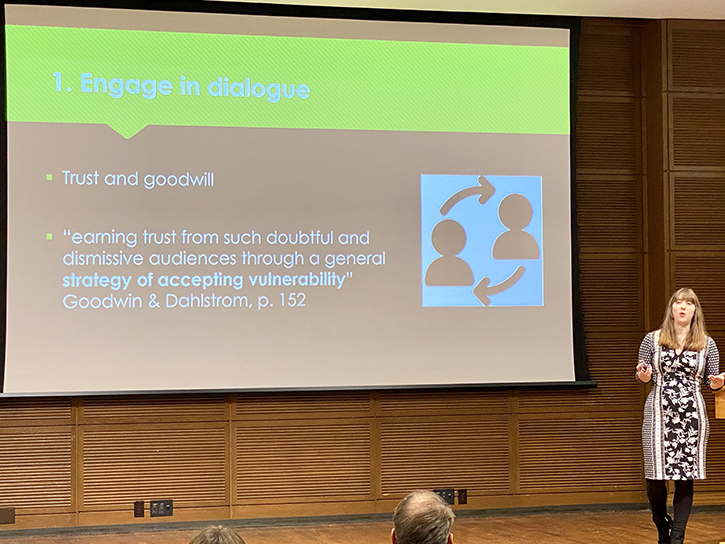Hanley Sustainability Institute

Professor: 'Engage' with 'skeptics,' don't argue with climate deniers
By Mark Gokavi
Language and approach are key to talking to those who don’t believe the science about climate change, a visiting professor told a University of Dayton audience on Thursday night.
Emma Bloomfield discussed her book, “Communication Strategies for Engaging Climate Skeptics,” for a group in Sears Recital Hall inside the Jesse Phillips Humanities Center. She was hosted by the Dept. of Communication, the Hanley Sustainability Institute and other campus entities.
Bloomfield, a professor at the University of Nevada-Las Vegas who specializes in the intersection of science and religious rhetoric, said words like “engaging” and “skeptics” are better than “arguing” or “deniers.”
While some studies show Christians are less likely to believe in climate change, Bloomfield said there are multiple views about climate change and that skeptics are not a homogenous group. She separated Christians into “separators, bargainers and harmonizers.”
Bloomfield said separators may use war metaphors, polarizing language and point to a “clash of worldviews.” She said strategies to talk to that group include asking questions to see how they got to that viewpoint and to make the conversation personal.
Bloomfield said bargainers negotiate or borrow some aspects of science. “They also modify scientific information,” she said. “They cherry-pick … certain authorities and use them as the scientific standard and model” and point out the small minority of scientists with dissenting climate views.”
She said bargainers can be approached from an economic standpoint, that they can be held to the scientific standards they do hold and to give them examples with which they can identify. Bloomfield said she found common ground when one interviewee agreed that vaccinations were good and that the science was settled despite the anti-vaccination crowd.
Bloomfield said harmonizers feel a calling to be environmentalists. “They seek harmony and alignment from their faith and environmentalism,” she said. “They don’t see things as a war; they don’t see things as trying to change people’s minds. They really think about climate change as a way to get us all together and collaborating.”
Bloomfield said harmonizers made personal choices, but they didn’t translate that into more meaningful action in the public space.
She said one person said they lied to their family about why they became a vegan and another said if he spoke publicly about being an environmentalist, “he would be ostracized if he went public about his beliefs, especially with friends and family members and people in his church network, who he assumed were climate skeptics.”
Bloomfield said her top strategies are to engage in open dialogue, learn from the other person and tell stronger, more local stories to overcome political identities and roadblocks.
For more University of Dayton sustainability news, please visit the Hanley Sustainability Institute’s news blog, the HSI website and the Sustainability Program website.
